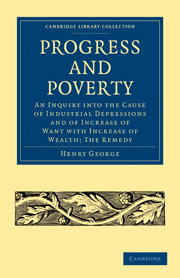 Progress and Poverty
Progress and Poverty Book contents
- Frontmatter
- PREFACE TO FOURTH EDITION
- Contents
- INTRODUCTORY
- BOOK I WAGES AND CAPITAL
- BOOK II POPULATION AND SUBSISTENCE
- BOOK III THE LAWS OF DISTRIBUTION
- BOOK IV EFFECT OF MATERIAL PROGRESS UPON THE DISTRIBUTION OF WEALTH
- BOOK V THE PROBLEM SOLVED
- BOOK VI THE REMEDY
- BOOK VII JUSTICE OF THE REMEDY
- Chapter I Injustice of private property in land
- Chapter II Enslavement of laborers the ultimate result of private property in land
- Chapter III Claim of land owners to compsnsation
- Chapter IV Property in land historically considered
- Chapter V Property in land in the United States
- BOOK VIII APPLICATION OF THE REMEDY
- BOOK IX EFFECTS OF THE REMEDY
- BOOK X THE LAW OF HUMAN PROGRESS
- CONCLUSION
- INDEX
Chapter V - Property in land in the United States
Published online by Cambridge University Press: 07 September 2011
- Frontmatter
- PREFACE TO FOURTH EDITION
- Contents
- INTRODUCTORY
- BOOK I WAGES AND CAPITAL
- BOOK II POPULATION AND SUBSISTENCE
- BOOK III THE LAWS OF DISTRIBUTION
- BOOK IV EFFECT OF MATERIAL PROGRESS UPON THE DISTRIBUTION OF WEALTH
- BOOK V THE PROBLEM SOLVED
- BOOK VI THE REMEDY
- BOOK VII JUSTICE OF THE REMEDY
- Chapter I Injustice of private property in land
- Chapter II Enslavement of laborers the ultimate result of private property in land
- Chapter III Claim of land owners to compsnsation
- Chapter IV Property in land historically considered
- Chapter V Property in land in the United States
- BOOK VIII APPLICATION OF THE REMEDY
- BOOK IX EFFECTS OF THE REMEDY
- BOOK X THE LAW OF HUMAN PROGRESS
- CONCLUSION
- INDEX
Summary
In the earlier stages of civilization we see that land is everywhere regarded as common property. And, turning from the dim past to our own times, we may see that natural perceptions are still the same, and that when placed under circumstances in which the influence of education and habit is weakened, men instinctively recognize the equality of right to the bounty of nature.
The discovery of gold in California brought together in a new country men who had been used to look on land as the rightful subject of individual property, and of whom probably not one in a thousand had ever dreamed of drawing any distinction between property in land and property in anything else. But, for the first time in the history of the Anglo-Saxon race, these men were brought into contact with land from which gold could be obtained by the simple operation of washing it out.
Had the land with which they were thus called upon to deal been agricultural, or grazing, or forest land, of peculiar richness; had it been land which derived peculiar value from its situation for commercial purposes; or by reason of the water power which it afforded, or even had it contained rich mines of coal, iron or lead, the land system to which they had been used would have been applied, and it would have been reduced to private ownership in large tracts, as even the pueblo lands of San Francisco (really the most valuable in the State), which by Spanish law had been set apart to furnish homes for the future residents of that city, were reduced, without any protest worth speaking of.
- Type
- Chapter
- Information
- Progress and PovertyAn Inquiry into the Cause of Industrial Depressions and of Increase of Want with Increase of Wealth; The Remedy, pp. 346 - 354Publisher: Cambridge University PressPrint publication year: 2009First published in: 1881
